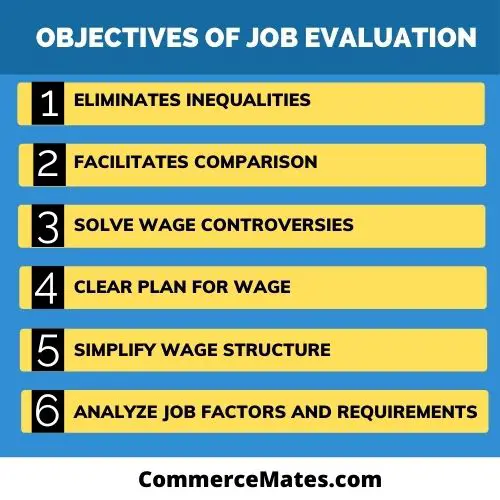Contents
Meaning of Job Evaluation
Job Evaluation is a systematic process of determining the worth of one job in relation to another job in the organization. During job evaluation, the relative worth of various jobs are assessed so that wages can be paid depending upon the worth of the job.
Objectives of Job Evaluation
- Eliminates inequalities: Job evaluation aims at removing inequalities in wage rates within the organization. Differential in wages for comparable works is an important factor that causes dissatisfaction among employees and leads to various conflicts among management and labor unions. Job evaluation ensures that a fair and adequate wage system is established in an organization for providing proper wages to workers.
- Facilitates comparison: Approach of job evaluation facilitates comparison of job by providing all necessary information. Data provided enables in doing a salary or wages comparison of one job with another within the organization or jobs of similar nature in other organizations. In addition to this, necessary information obtained is used for the community wage surveys.
- Solve wage controversies: Job evaluation is very helpful in resolving wage controversies by providing a relative objective basis involving comparative rates. This approach by collecting all necessary information related to job positions enables management in following a more rational and consistent salary and wages structure for people working in an organization. A logical basis is created for negotiation of wages and collective bargaining.
- Analyze job factors and requirements: The process of job evaluation focuses on analysis of job positions which enables in selecting right candidates. Analysis of job is done from two aspects: Job description and job specifications. Job description refers to what role or responsibilities need to be performed holding a job position. Whereas, job specification deals with the qualifications required by candidate for effectively delivering his duties.
- Eliminates personal prejudices: Job evaluation eliminates personal prejudices from organization which demotivate employees from performing efficiently. In case of favoritism by management in respect of some employees in setting of wage rate, it will lead to personal prejudice. Job evaluation process rate only the job but not the employees which removes all grounds of favoritism and personal prejudice.
- Clear plan for wage administration: It establishes a wage rate for different job positions within the organization on scientific basis. Under such wage rates, it become easy for managers to evaluate employee’s performance in terms of job. Managers can more efficiently decide the promotion and transfer of employees. All these things assist the wage department in managing its operations in more convenient way.
- Standardization of wage and salary rate: Job evaluation has an effective role in bringing standardization in wages and salary levels in an organization. A high degree of standardization is attained when wages rate for various job positions is decided on scientific basis. Salary structures are uniformed throughout the organization in all of its plants even if they are located in different areas.
- Simplify wage structure: The simplification of wage structure is another important benefit provided by job evaluation approach. Every job is divided into distinct elements which are graded for establishing the wage rates. The range of wage rate with minimum and maximum amount is also established. In addition to it, for the periodic review of wage structure, a provision is made. All these lead to simplify the structure of wages in an organization.

Importance of Job Evaluation
- Assist in employee’s selection: This is one of the major advantages provided by technique of job evaluation. It properly analyses the job specification in line with the competencies of candidates. Employees are chosen on the basis of their qualification required in delivering the role effectively. All these factors enable in choosing right candidates by organization.
- Specialization: Job evaluation assist in specialization of labor by organization. There are large number of job positions within an enterprise which requires many employees for performing them. Therefore, a job evaluation technique does a clear division of labor by defining them their roles properly which results in specialization of labor.
- Develop harmonious relations among manager and employees: Every company want to develop harmonious relations with their staff members. Job evaluation works towards minimizing controversies among manager and employees by eliminating all wage differentials within the business enterprise.
- Avoids inequalities in salary structure: Job evaluation approach focuses on avoiding inequalities in wage and salary structure of organization. It establishes a scientific basis for fixing remuneration of workforce by collecting all relevant information about job positions. Proper salary structure is an important determinant of affecting the efficiency and motivation level of workers.
- Prevents conflicts within organization: It resolves all conflicts within organization by paying peoples in a fair manner. All inequalities in wage rate and personal prejudices are eliminated by doing a standardization of salary and wage rate. Job evaluation collects key information about job positions which serve as a logical basis for collective bargaining and wage negotiations thereby avoiding any conflicts in an organization.
